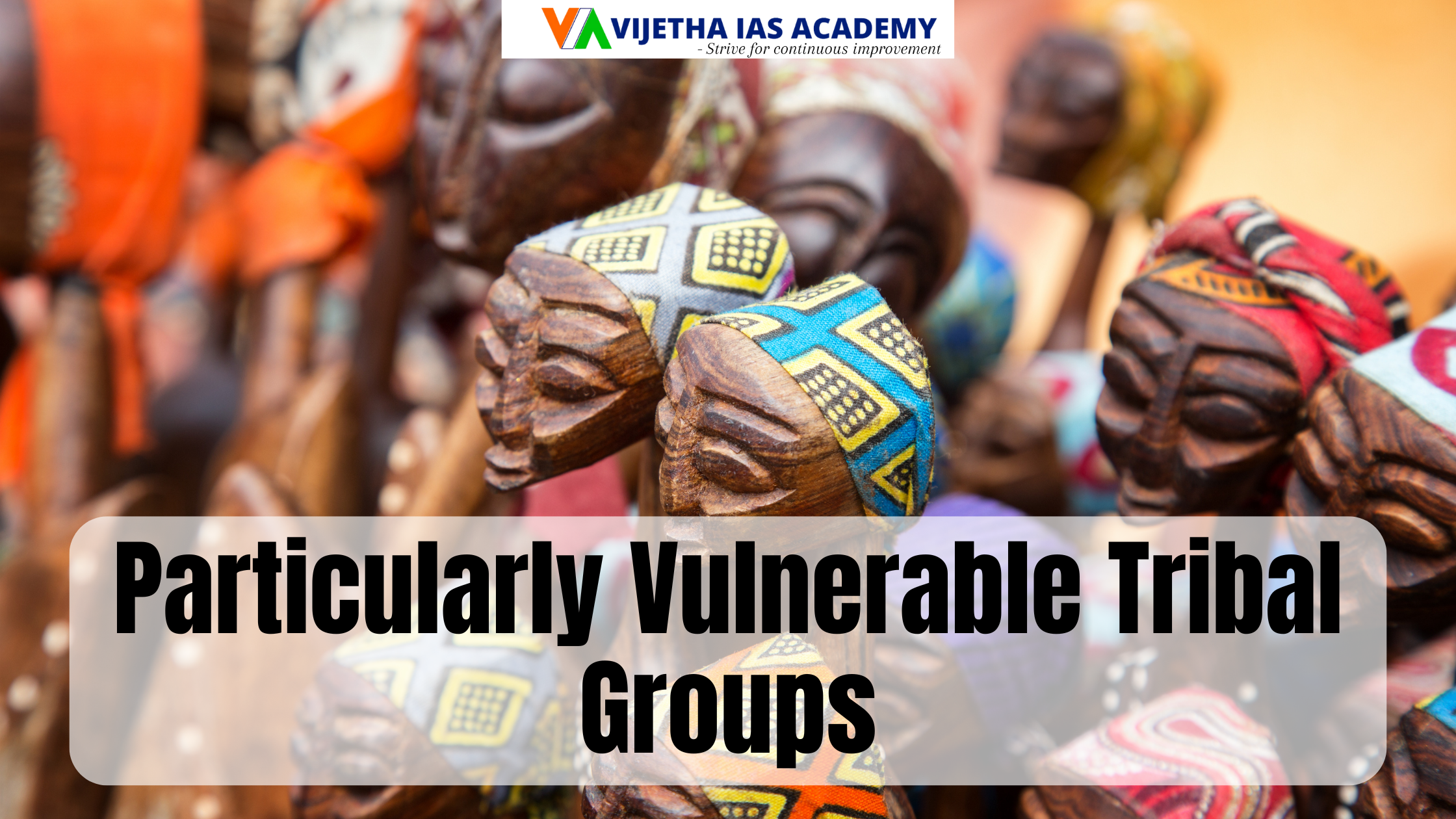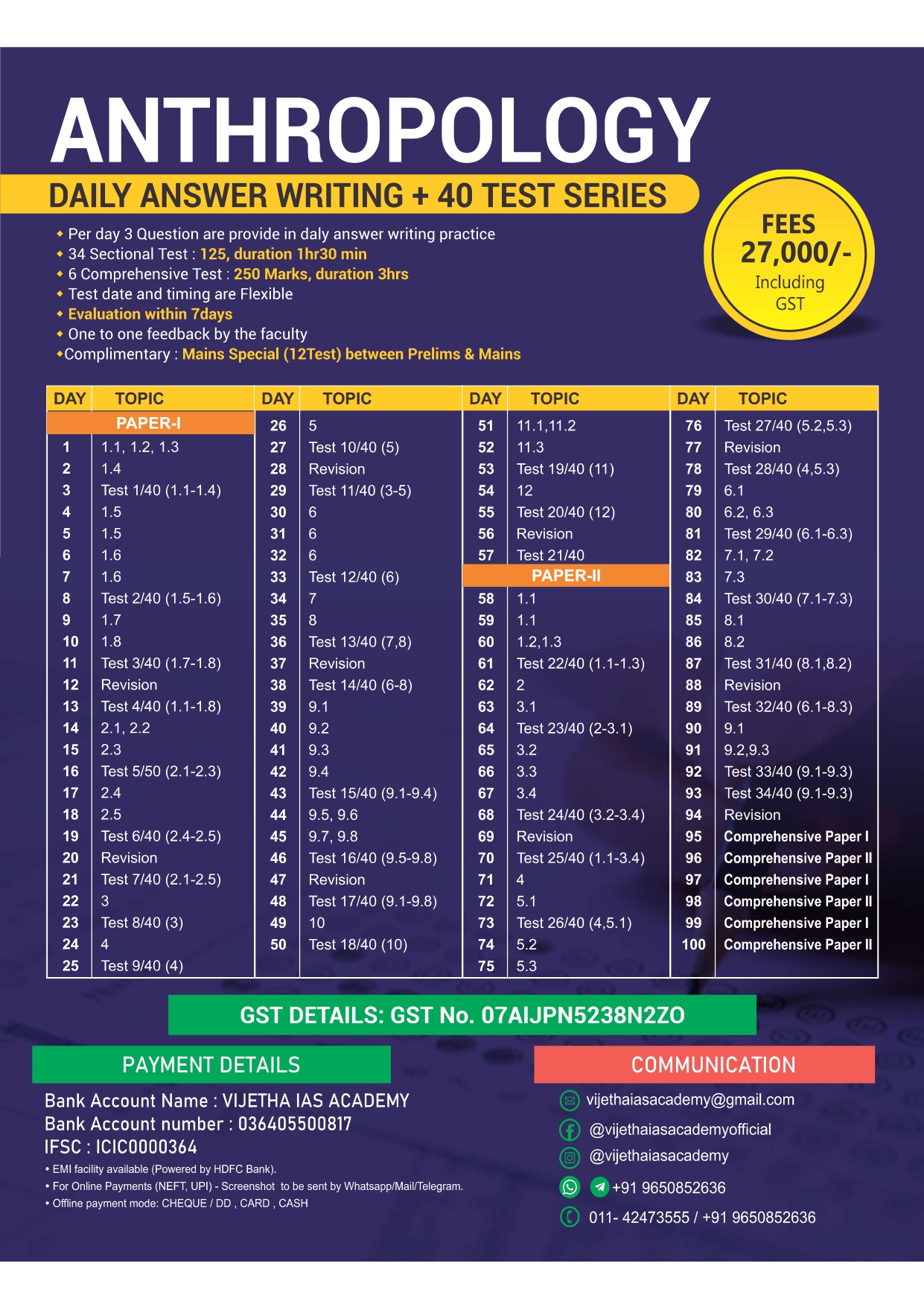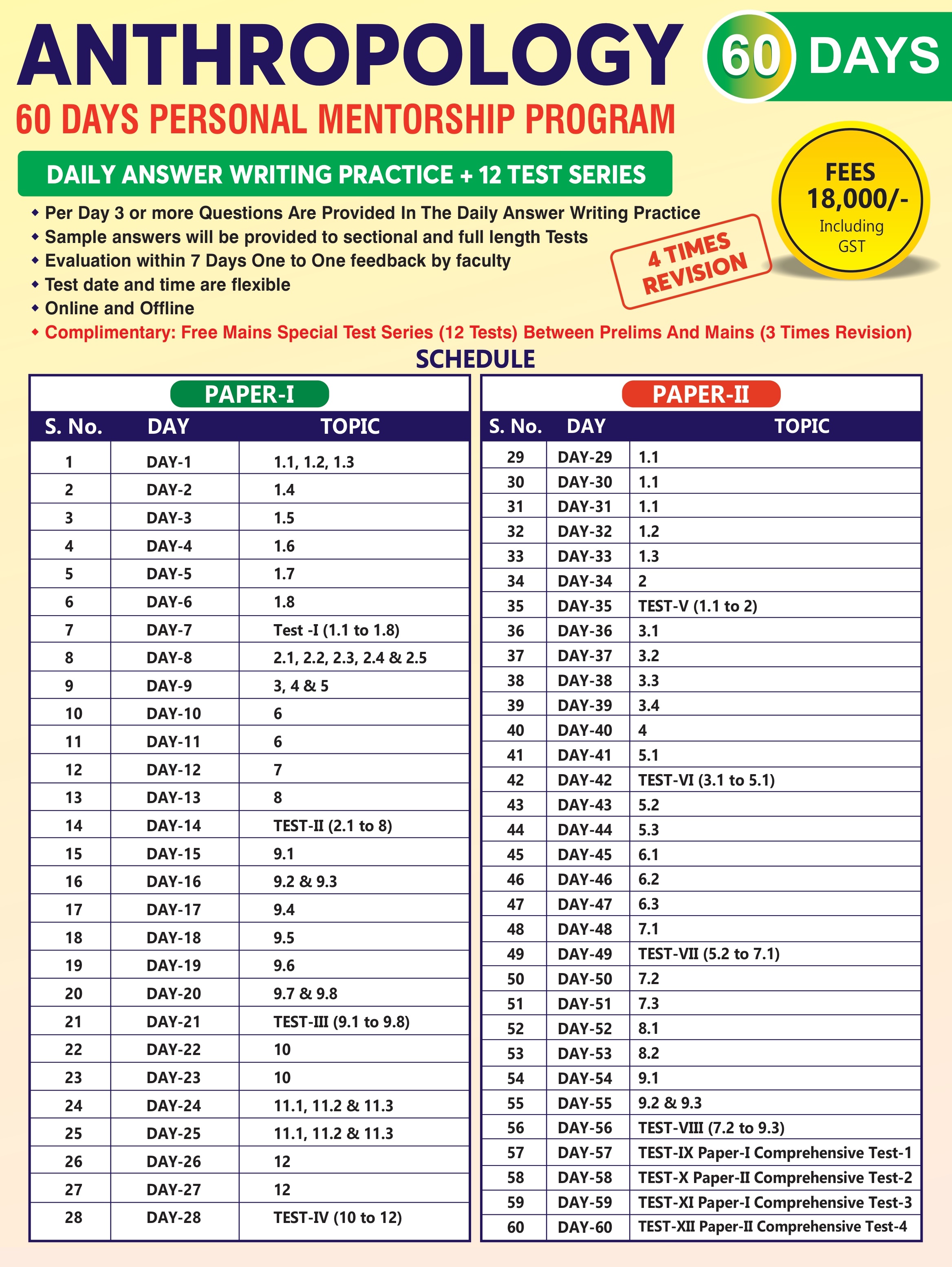
Critically discuss the recent welfare measures initiated by the Government for the Particularly Vulnerable Tribal Groups (PVTGs). Comment why PVTGs were erroneously called Primitive Tribal Groups (PTGs).
(20 Marks) Anthropology Optional Paper CSE 2024
Introduction
Particularly Vulnerable Tribal Groups (PVTGs) are a subset of the tribal population in India identified for special attention due to their extreme vulnerability. Characterized by pre-agricultural practices, low population, isolated habitats, and poor socio-economic conditions, PVTGs face significant developmental challenges. There are currently 75 PVTGs in India, spread across 18 states and the Andaman & Nicobar Islands. Over the years, the Indian government has introduced various welfare measures to address their specific needs. Initially labeled as Primitive Tribal Groups (PTGs) in 1975, this term was later replaced with PVTGs to avoid derogatory connotations.
Main Body
Welfare Measures for PVTGs:
Pradhan Mantri Vanbandhu Kalyan Yojana: This scheme aims at holistic development of tribal areas by focusing on improving infrastructure, education, healthcare, and livelihoods. It places particular emphasis on PVTGs, ensuring they have access to basic services.
Development of PVTGs Scheme: This initiative, under the Ministry of Tribal Affairs, is a comprehensive development program targeting housing, land distribution, agricultural support, education, health services, and drinking water facilities for PVTGs. The scheme aims to improve the living conditions of these communities while respecting their unique cultural practices.
Forest Rights Act (2006): The Forest Rights Act recognizes the traditional land rights of tribal communities, including PVTGs. It helps secure individual and community land ownership, essential for their survival, as PVTGs are often forest-dependent communities.
Jan Shikshan Sansthan (JSS) Scheme: This initiative aims to impart vocational training to PVTGs, helping them acquire skills for livelihood diversification and self-employment. The focus on sustainable income generation reduces their dependence on traditional livelihoods, which are often under threat.
National Health Mission (NHM): Special healthcare provisions under NHM have been initiated to address the high levels of malnutrition, mortality rates, and diseases prevalent among PVTGs. Health sub-centers and mobile units are deployed to improve access to healthcare in remote tribal areas.
Challenges and Criticisms:
Implementation Gaps: Despite numerous schemes, the effective implementation of these welfare programs remains a challenge due to bureaucratic delays, lack of infrastructure, and poor coordination between state and central agencies. Many PVTGs continue to face displacement, poor living conditions, and inadequate access to resources.
Lack of Cultural Sensitivity: Welfare programs often fail to consider the cultural uniqueness of PVTGs, imposing development models that clash with their traditional ways of life. This has led to instances where well-intentioned programs have undermined the self-sustaining nature of PVTG economies.
Health and Education Disparities: Access to education and healthcare remains limited, with high dropout rates in schools and a lack of healthcare personnel willing to serve in remote tribal areas. This creates a continuing cycle of poverty and underdevelopment.
Shift from PTGs to PVTGs:
Primitive Tribal Groups (PTGs) was the original term used to classify these communities, but it was criticized for being derogatory and reinforcing stereotypes of backwardness and inferiority. The term "primitive" was seen as culturally insensitive, implying that these groups were less evolved or civilized.
In 2006, the term was officially changed to Particularly Vulnerable Tribal Groups (PVTGs) to acknowledge their vulnerability without stigmatizing them. The new term emphasizes the need for special attention and protection, focusing on the challenges they face rather than framing them as inferior.
Successes and Limitations:
Successes: Some PVTGs have benefited from improved access to healthcare, education, and housing, particularly through targeted interventions. In some states, PVTG communities have been able to assert their land rights under the Forest Rights Act, securing their livelihoods and traditional ways of life.
Limitations: However, the overall impact remains uneven. Many PVTGs continue to suffer from marginalization, lack of access to development programs, and persistent poverty. The limited reach of welfare schemes and the gap in monitoring and evaluation have left many communities without adequate support.
Conclusion
While the Indian government has introduced several welfare measures to address the needs of PVTGs, challenges in implementation, cultural insensitivity, and bureaucratic delays have limited the success of these programs. The reclassification from PTGs to PVTGs was a step toward recognizing the unique vulnerabilities of these groups without derogatory labels. To fully uplift PVTGs, there is a need for inclusive, participatory development approaches that respect their cultural uniqueness and ensure their active participation in decision-making processes. This, combined with more effective implementation and monitoring, will be crucial in improving the lives of PVTGs.
Anthropology Test Series Programme (Online + Offline))
We provide Anthropology Daily Answer Writing a range of programs designed to cater to various stages of UPSC preparation. Whether you're just starting out, have attempted the Mains before, or are getting ready for Mains 2024, we have the right option for you. Allow us to assist you in choosing the course that best fits your needs.
|
Level of Preparation |
Test Series Program |
Test Series Content |
Test Schedule |
|
Self-study of Anthropology Optional |
Anthropology 100 Days Personal Mentorship Program |
Daily answer writing, 34 sectional tests, 6 comprehensive tests, and complementary Mains Special 12 tests (between prelims and mains) |
|
|
Revise whole syllabus through Daily Answer Writing Practice and Tests |
Anthropology DAW Mentorship Program |
Daily Answer Writing Practice and 8 sectional and 4 Full Length tests |
|
|
Revise whole syllabus through Sectional and Full Length Tests |
Anthropology Tier- I T-40 Test Series |
34 Sectionals and 6 Full Length Tests |
|
|
Written Mains earlier and need more practice |
16-Anthropology Tier II Test Series |
10 sectional and 6 Full-Length Tests. |
|
|
Cleared Prelims 2023 and are preparing for Mains 2023 |
Mains Special 12 Tests program |
8 Sectional and 4 Full-Length Tests |
ANTHROPOLOGY MAINS SPECIAL COURSES
Enroll in our Anthropology Mentorship Program today and take the first step towards achieving your UPSC goals!
1) If you are going for Self study of Anthropology Optional and looking for a Comprehensive Program that includes Daily Answer Writing, 34 Sectional tests, 6 Comprehensive tests, and Complementary mains special 12 tests (between prelims and mains), our Anthropology 100 Days Personal Mentorship Program is the perfect choice.
2) If you want to revise Whole Syllabus through Daily Answer Writing Practice and 8 sectional and 4 full length tests, then our Anthropology DAW Mentorship Program is the best fit for you.
3) If you want to revise Whole Syllabus through 34 Sectionals and 6 Full Length Tests then Anthropology Tier- I T-40 Test Series is for you.
4) If you have written Mains earlier and need more practice, then our 16-Anthropology Tier II Test Series is a great option. This test series includes 10 sectional and 6 full-length tests.
5) if you have cleared Prelims 2023 and are preparing for Mains 2023,our Mains Special 12 Tests program is a must-have. This program includes 8 sectional and 4 full-length tests to help you prepare for the big day.
For more information on Vijetha IAS Academy’s Anthropology mentorship programs Deatils : https://vijethaiasacademy.com/anthropology-test-series
Anthropology 100 Days Personal Mentorship Program ( 7 + 3 Times Revision )

Anthropology 60 Days Personal Mentorship Program ( 4 + 3 Times Revision )

For more information: https://vijethaiasacademy.com/anthropology-test-series
Details Of Anthropology Classes Program
Top Anthropology Optional IAS Coaching Center in Delhi Vijetha IAS Academy | Best Anthropology Optional IAS Coaching in Delhi
Fee Structure:
- Tier 1: Rs. 55,150/- (3 Years Validity of Offline/Live Batch)
- Tier 2: Rs. 42,000/-
- Tier 3: Rs. 36,000/-
Batch Size: 50 – 60 Students
UPSC Notes
Anthropology Optional IAS Coaching Notes, IAS Exam Preparation Booklets, IAS optional coaching Notes, UPSC Coaching Notes, Video Lectures, Live Classes with faculty, Chat Facility Available
Teachers Name: N P Kishore Sir
Past Result
- Last Years Result 2023
- 35 Total Selections in CSE 2023
Google Reviews: 4.9 out of 5 stars
Website: Vijetha Anthropology Optional IAS Coaching in Delhi (https://vijethaiasacademy.com)
Faculties of Vijetha IAS Academy
- N P Kishore Sir
Features
- Vijetha IAS Academy offers Online and offline Courses for better preparation of Anthropology Optional Strategy for UPSC in Delhi.
- For better Anthropology optional Exam Preparation, Vijetha IAS Academy Delhi Conducts the Motivational IAS Session.
- Vijetha IAS Academy provides you with the CASE STUDIES on the pattern of the real-time IAS Exam which is helpful for better preparation of the Best Coaching for UPSC Anthropology Optional Optional IAS Examination.
- DAW & WAW – Revision Through Daily & Weekly Answer Writing Practice is offered by Vijetha IAS Academy for better result of the Anthropology Optional IAS examination.
Advantages of joining Vijetha IAS Academy
- Best Faculties for Anthropology Optional IAS Coaching in Delhi
- Best facilities, infrastructure and updated Case Studies Booklets and Notes for better preparation of the Anthropology Optional IAS Examination in Delhi.
- Best result in Past years for Anthropology Optional Strategy for UPSC Examination in Delhi
- Best Rated coaching institute for Anthropology Optional IAS Examination in Delhi.
- Vijetha IAS Academy also provides recorded lectures videos, notes which is very helpful for better preparation of Anthropology Optional IAS Coaching in Delhi
Fees Structure of Vijetha IAS Academy
|
Tier 2 |
Tier 1 |
Tier 3 |
BATCH STARTS FROM |
|
42,000/- |
55,150/- (3 Years Validity Offline/Live Batch) |
36,000/- |
REGISTRATION – START |
Fees Structure of Vijetha IAS Academy
|
Course Name |
Fees Amount |
Course Duration |
|
GS Offline (Pre + Mains+ CSAT) with Essay+Answer Writing |
Rs.99,000 (Including GST) |
400+ Days |
|
GS Online |
Rs.18,999 (Including GST) |
400+ Days |
|
GS Mentorship Programme |
Rs.29,999 (Including GST) |
1 Year |
For more information on our courses, visit our Anthropology Courses page. Explore our Test Series and Online Courses for flexible learning options.
Vijetha IAS Academy
Add. 2nd Floor, 50, Shankar Road, Block 7, Old Rajinder Nagar, Rajinder Nagar, New Delhi, Delhi 110060
MOB. 096508 52636
Open 7 Am: Closes 9 PM
____________________________________________________________________________________________________________________
Keywords: Synergistic Effects of Biological and Cultural Factors in Human Evolution , anthropology 2024 question paper, Anthropology optional subject question paper 2024, Anthropology optional 2024 question paper, Anthropology Optional Coaching UPSC, Vijetha IAS Academy Anthropology, Anthropology crash course UPSC, Anthropology daily answer writing UPSC, Kishore sir Anthropology
